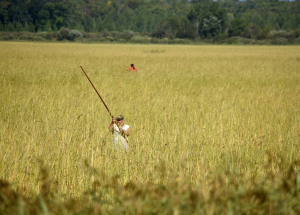‘This would be the first law to recognize the legal rights of a plant species’
This news story appeared on the Healing Minnesota Stories website, on January 12th, 2019.
The White Earth Band of Ojibwe and the 1855 Treaty Authority are taking action to address the growing threats to native wild rice, such as potential crude oil pipeline spills or the spread of genetically modified wild rice. They are establishing new laws and claiming treaty rights to protect their culture and sacred food.
The 1855 Treaty Alliance was established to protect the treaty rights of Leech Lake, Mille Lacs, White Earth, East Lake and Sandy Lake bands. The Alliance covers those lands the Anishinaabe ceded as part of their 1855 Treaty with the United States. (Among those treaty rights, bands claim the right to hunt, fish and gather — including harvesting wild rice — on ceded lands.)
According to a media statement from the 1855 Treaty Alliance:
Recently the White Earth Band of Ojibwe and the 1855 Treaty Alliance adopted Rights of Manoomn for on and off reservation protection of wild rice and the clean, fresh water resources and habitats in which it thrives. The Rights of Manoomin were adopted because “it has become necessary to provide a legal basis to protect wild rice and fresh water resources as part of our primary treaty foods for future generations” …
White Earth and the 1855 Treaty Alliance drafted their resolutions with the help of the Community Environmental Legal Defense Fund (CELDF) with its International Center for the Rights of Nature, according to the media release. Mari Margil, CELDF’s associate director, said the Rights of Manoomin resolutions were a big step forward for the Rights of Nature Movement: “This would be the first law to recognize the legal rights of a plant species,” she said. MORE…

